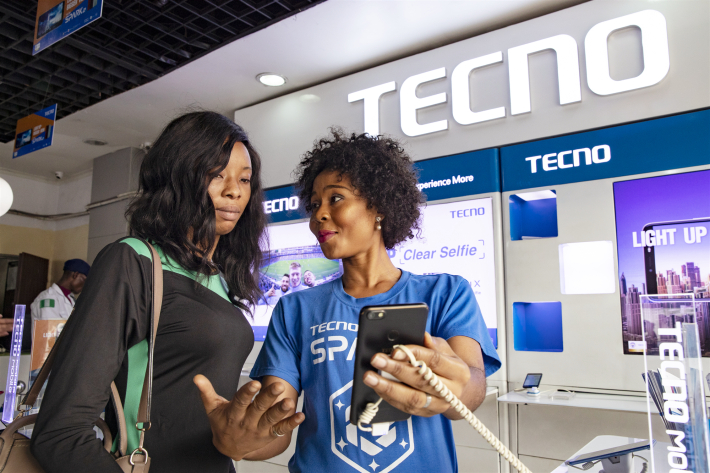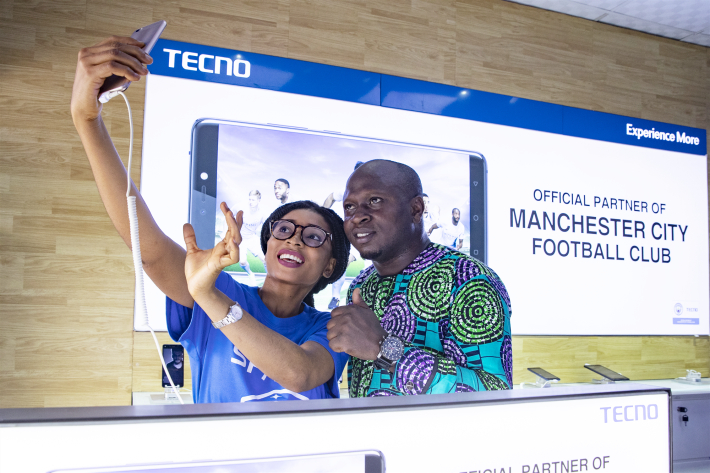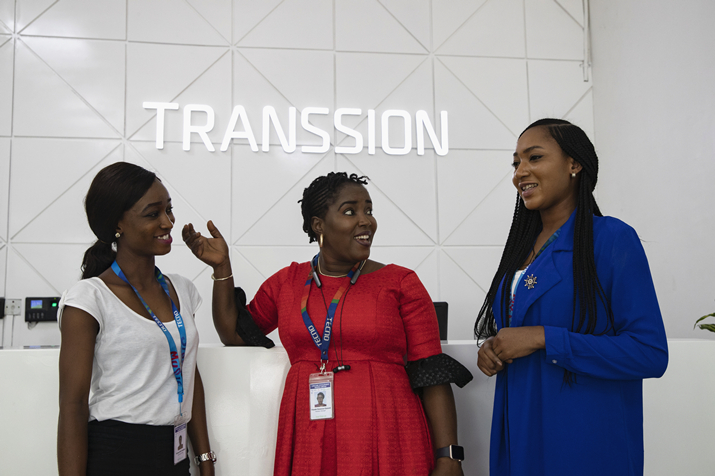|
||||||||||
| Home Nation World Business Opinion Lifestyle ChinAfrica Multimedia Columnists Documents Special Reports |
|
||||||||||
| Home Nation World Business Opinion Lifestyle ChinAfrica Multimedia Columnists Documents Special Reports |
| ChinAfrica |
| The Call of Success |
| A little-known Chinese company leads the way in Africa's mobile phone market |
| By Xia Yuanyuan | VOL.10 December ·2018-11-26 |
If you find yourself in Lagos and you're a gadget freak, make your way to the Ikeja electronic market, believed to be the largest of its kind in West Africa.
Also known as Computer Village, it is one of the busiest and most popular places in Lagos, the economic capital of Nigeria.
But down on the ground among the myriad of different electronic devices sold in countless alleys, a marketing phenomenon cloaked in bright blue shopfronts rules the roost. Welcome to TECNO, the brand that in the 10 years of its existence has emerged as the front runner in Africa's booming mobile phone market. In China, few people have heard of TECNO or its owner - TRANSSION Holdings. As a major mobile phone manufacturer in the world and one of the largest smartphone vendors in Africa, it was one of the first Chinese mobile phone manufacturers to explore the African market and have a mobile phone plant in Africa.
Despite not having a single store in China and based at a low-key headquarters in Shenzhen in south China's Guangdong Province, TRANSSION has out-performed all the more illustrious smartphone brands including Apple, Samsung and Huawei in Africa.
People's favorite
"TECNO! TECNO! TECNO!"
In 3C Hub, just one of the many mobile phone stores in the market, mobile vendors tirelessly call out to promote phones to customers. It's obvious that TECNO has super high popularity as its display stand was swamped with customers.
"This is not the first time I buy a TECNO smartphone. It is the most cost-effective phone I've used," Virginia Madubuko, a customer, told ChinAfrica.

A TECNO seller explains a Tecno phone to a customer (CHEN JIAN)
Established in 2006, TRANSSION is a Chinese diversified global hi-tech conglomerate specializing in mobile communication, best-known for its leading mobile phone brands, including TECNO, itel and Infinix.
In June 2008, the company set up its first African office in Nigeria, targeting Africa's most populous nation and developing its Africa-focused brand marketing.
Zhu Zhaojiang, Founder of TRANSSION, made the decision to enter the African market after careful consideration and investigation. He traveled to many African countries and his research told him that African users wanted their own mobile phones made especially for their needs.
"Our original goal was to produce mobile phones at affordable prices with uncompromised quality, offer our African customers phones designed specifically for them, as well as give customers the best after-sales service on the continent," said Duan Shengxiao, General Manager of TRANSSION's Nigeria Office.
In addition, according to the company's research, 10 years ago, while the mobile penetration rate had reached 60-70 percent in China, the figure was only 10-20 percent in Africa. The continent therefore had a promising mobile market.
Over the past decade, the company has developed a global sales network in more than 50 countries, including Nigeria, Kenya, Tanzania, Ethiopia and Egypt, and become the leading player in the mobile phone industry in the African market.
In 2017, TRANSSION sold nearly 130 million mobile phones globally, and 70 percent were sold in Africa, its official data showed. According to figures of International Data Corp., a premier global market intelligence firm, in 2017, the company's mobile phone brands held the largest market share in Africa.
Since 2016, the TECNO, itel and Infinix brands have consistently ranked among African Business magazine's top 100 most admired brands. In 2018, TECNO ranked seventh on the list while itel and Infinix placed 16th and 28th respectively.
Regional focus
In front of the stand, Inaku Felicia, a local resident, posed for a picture with a TECNO Camon X Pro and was amazed with her selfie. "As a selfie enthusiast, I am quite satisfied with this phone's camera," she told ChinAfrica.
Camon X Pro is not the only TECNO phone with a strong selfie feature. TECNO cameras have been optimized for African customers. "Our cameras adjust [and provide] more light for darker skin tones," said Duan. "That's one of the reasons we've become successful."
It also analyzes users' face shapes, skin colors and preferences of photo effects to determine how much extra light exposure is needed to take better-looking photos.

TECNO seller takes a selfie with a customer (CHEN JIAN)
A unique selfie feature is not the only innovation TRANSSION has made to satisfy the need of African customers. For years the company has worked to understand the different needs of consumers, with the appreciation that culture, lifestyles and economic situations all come together to affect the lives of people.
"Our company is always making adjustments to product features based on the needs of African users," said Wang Xin, Marketing Director of TRANSSION's Nigeria Office. It is common for Africans to change multiple SIM cards throughout the day to avoid the steep charges operators levy for calling different networks. Though it is inconvenient, most cannot afford two phones. TRANSSION solved the problem from its inception in Nigeria in 2008 by fitting dual-SIM cards in their phones.
In addition, in countries like Nigeria and Ethiopia, cities have frequent power outages to conserve power for peak periods, leaving people unable to charge their phones for hours. Worse still, in less developed markets such as the Democratic Republic of the Congo, consumers might have to walk 30 km to charge their phone at the local market. To solve this problem, TRANSSION's phones were given a longer battery life.
"My TECNO phone can take me through 24 days of usage. No frequent charging means a more convenient life," customer Halima Elelu told ChinAfrica.
And in an effort to provide value-added service, TRANSSION launched after-sales service centers called Carlcare and its smart accessories brand oraimo across the continent.
TRANSSION has also opened research and development centers in China, Nigeria and Kenya to work out how to better appeal to African users. Local languages such as Amharic, Hausa and Swahili were also added to keyboards. Most importantly, TRANSSION's phones are very affordable. Compared to Apple and Samsung which can set consumers back hundreds of dollars, TRANSSION's phones are priced for the pockets of ordinary Africans at around $10-$300, according to Fang Ruicheng, Retailor Director of TRANSSION's Nigeria Office. Despite the low-price tag, the phone offers many features you'd expect in phones priced much higher.
Made in Africa
TRANSSION's phones are not only made for Africa, but made in Africa. In September 2011, TRANSSION set up its own factory in the outskirts of Addis Ababa, Ethiopia's capital. Since 2011, every TRANSSION's mobile phone that has been sold in Ethiopia has been assembled on the outskirts of Addis Ababa. Every day, local employees assemble the screens, boards, and batteries (produced in Shenzhen), producing thousands of smartphones and feature phones. Over 90 percent of its employees in Africa are local workers.

Olayode Opeyemi Mercy (middle) and her colleagues
Olayode Opeyemi Mercy, promoted from data analyst to admin manager of TRANSSION in the Nigeria Office, said she has received a steady increase in salary and job promotion, ever since she joined the company in 2011.
"Before I was employed in TRANSSION, I was working in a bank for five years, now many of my previous colleagues envy my job and asked me whether they can join TRANSSION," Olayode told ChinAfrica.
During the seven years, Olayode has been able to learn new skills and also get a chance to learn the Chinese language in the Confucius Institute of the University of Lagos. "I have learned how to work diligently and efficiently from my Chinese colleagues," she added.
Lighting up Ikeja
As a brand that believes in giving back, TECNO always emphasizes the fulfillment of social responsibility. It runs various corporate social responsibility projects across its markets, such as the Light up Ikeja initiative.
The Ikeja street community in Lagos has dense crowds during the day, but once the sun sets, the area is cloaked in darkness, with not a single street light in sight. After learning about this situation, in 2016, TECNO took the initiative and installed 88 solar LED lights for the community free of charge. After the launch of the streetlight project, businesses could continue to operate and the security of the area improved.
Besides, itel mobile revived hopes for the people of Makoko Community in Lagos, especially in the area of education.

Children in Makoko Community in Logos get branded Itel school bags from itel team (COURTESY PHOTO)
The Makoko Community is a settlement of about 100,000 people who live in shanties that are erected over muddy water. In 2017, the itel team sent branded itel school bags, cartons of noodles, clothing, children's toys, books, groceries and other daily essentials to the community, along with a medical outreach program to over 1,000 children and women in the community.
Speaking at the event, Oke Umurhohwo, Marketing Communications Manager of itel, said the company's vision was to help individuals and communities overcome challenges created by their environments, adding that "this shows our resolve to enriching and benefitting our society."
(Reporting from Nigeria)
(Comments to xyy@chinafrica.cn)
| About Us | Contact Us | Advertise with Us | Subscribe |
| Copyright Beijing Review All rights reserved 京ICP备08005356号-5 京公网安备110102005860号 |